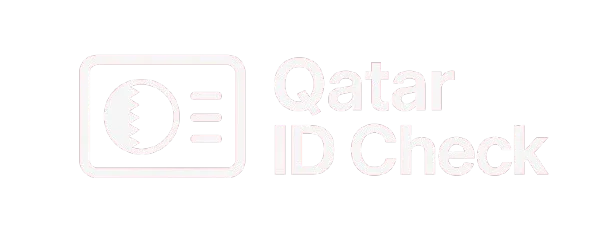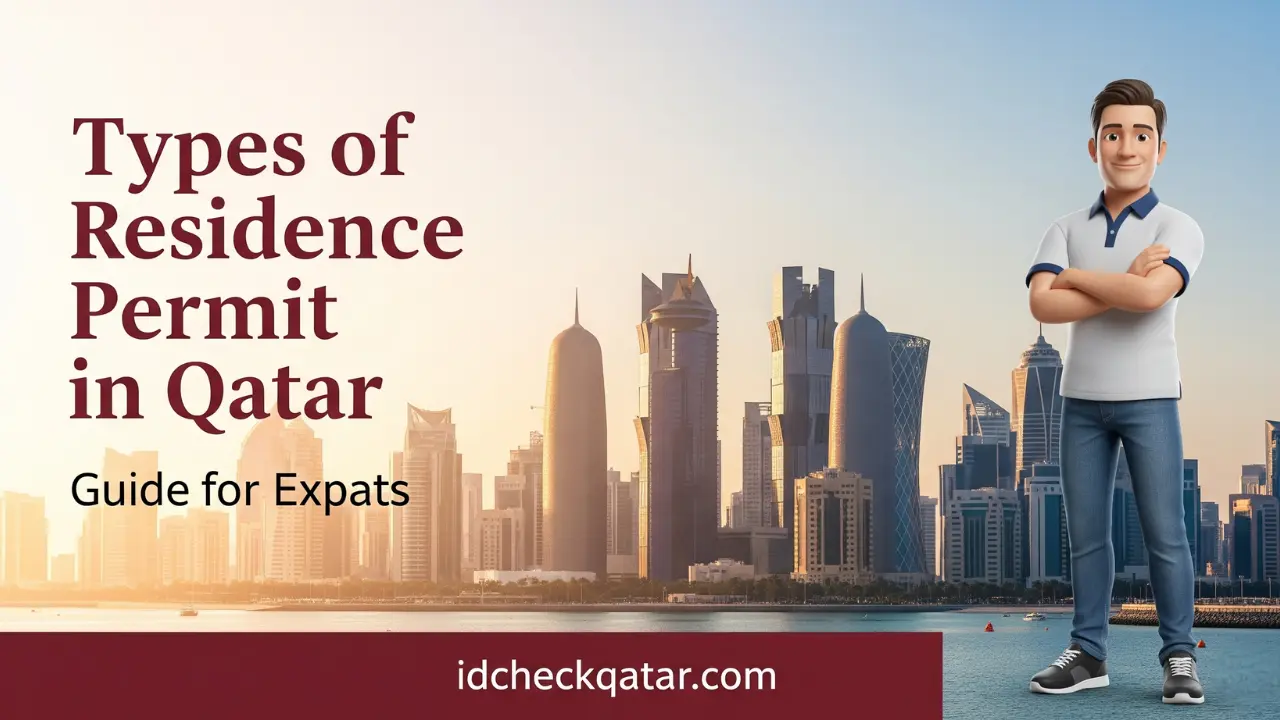Types of Residence Permit in Qatar – Full Guide for Expats in 2026
There are several types of residence permit in Qatar, each designed for specific purposes like employment, family sponsorship, or temporary stay. Understanding the differences is important whether you are planning to work, sponsor your family, or stay for a short time.
In Qatar, residence permits are categorized into work, family, temporary, and special permits based on the reason for stay. Each has its own process, sponsor, and required documents.
If you already have a Residence Permit or are in the process of obtaining one, this guide will help you understand which residence permit applies to your case. For a complete overview of how to verify your QID status, visit the main Qatar ID check guide here. It also explains how your QID links with your residence permit.
What Is a Residence Permit in Qatar?
A residence permit (RP) allows foreigners to legally stay in Qatar beyond the period granted by their entry visa. Once your visa is approved and you arrive in Qatar, the permit must be processed, usually through your employer, sponsor, or family member.
It is directly linked with your Qatar ID (QID) and is essential for daily activities like opening a bank account, registering a SIM, or getting a health card.
Quick Comparison of Residence Permit Types in Qatar
Here’s a quick table to help you understand the key differences between the main types of residence permits in Qatar.
| Type of Residence Permit | Who It’s For | Sponsor | Key Notes |
|---|---|---|---|
| Work Residence Permit: | Foreign employees | Employer | Must have a job contract |
| Family Residence Permit: | Spouse, children, parents | Employee | Salary and housing requirements |
| Temporary Residence Permit: | Short-term workers, interns | Company or MOI | Valid for 3–6 months only |
| Student Permit: | University students | Educational institution | Needs admission |
| Domestic Worker Permit: | Maids, drivers, nannies | Family | Household sponsor and contract |
| Investor/Business Permit: | Business owners and investors | Self / Company | Often requires large capital |
1. Work Residence Permit
The work residence permit is the most common among the different types of residence permit in Qatar. It’s essential for any expat planning to live and work in Qatar long term.
Key features:
- Sponsored by the employer.
- Requires a valid job offer and medical clearance.
- Must be renewed annually or as per contract.
This type of RP forms the basis for many expats to live in Qatar legally. If you’re unsure about the full process, you can follow this guide on Qatar work residence permits which breaks it down step-by-step.
2. Family Residence Permit
This permit allows residents with a valid job and salary to sponsor their wife, children, or parents. The family RP is popular among long-term residents who want to bring their family to Qatar.
Eligibility Requirements:
- Minimum monthly salary (usually QR 10,000 or more).
- Housing under the sponsor’s name.
- Valid employment RP.
You can read more about the process and eligibility for sponsoring family in Qatar through this family RP guide.
3. Temporary Residence Permit
While this isn’t the most common, it still falls under the recognized types of residence permit in Qatar, especially for interns, contractors, or seasonal workers.
- Employees on short contracts.
- Project-based workers.
- Students or interns.
It does not offer the same rights as a long-term RP, such as family sponsorship or health insurance coverage.
For more on this, the detailed breakdown of temporary residence permits in Qatar explains the scope and how to apply.
4. Student Residence Permit
Qatar’s universities and educational institutions sponsor international students with a student RP. This permit allows the student to reside in Qatar for the duration of their academic program.
Required Documents Include:
- Admission letter from the institution.
- Proof of accommodation.
- Sponsorship (usually from the university).
Student permits are also one of the types of residence permit in Qatar, though they are issued less frequently than work or family permits.
5. Domestic Worker Residence Permit
Families in Qatar can sponsor domestic workers like maids, drivers, and nannies through this special category. It falls under the household employment sector and is regulated by labor laws.
Conditions Include:
- Salary requirements for the sponsor.
- Accommodation must be provided.
- Contract submission through the MOI.
This type of RP is processed through specialized channels of the Ministry of Interior.
6. Investor or Business Residence Permit
Qatar also grants RPs to investors and business owners, especially those who start or co-own companies. These are high-value permits and offer more flexibility.
You may not need a traditional employment sponsor if you qualify for this permit type.
While not the same as permanent residency, business RPs can sometimes lead to long-term stays. If you’re interested in that route, the Qatar permanent residency section is also useful.
How Are These Permits Linked to Your Qatar ID?
Each residence permit is connected to a Qatar ID (QID) issued by the Ministry of Interior. Without a valid QID, you cannot perform essential services like:
- Applying for health cards.
- Registering your mobile number.
- Opening a bank account.
If your QID is delayed or missing, follow this fix for Qatar ID not showing in Metrash to resolve it fast.
Validity and Renewal of Residence Permits
Most residence permits are issued for 1 to 3 years and must be renewed before expiration. Employers, sponsors, or individuals are responsible for renewal based on the type of permit.
The renewal process varies by category, but general steps include:
- Submitting the renewal request online or via Metrash.
- Paying the renewal fee.
- Providing updated documents if required.
Renewals are often managed through the Metrash app or at MOI service centers.
Residence Permit vs. Entry Visas
Many people confuse entry visas with residence permits. Entry visas allow you to enter Qatar. Residence permits allow you to stay and live legally.
For example:
- A tourist visa is not a residence permit.
- A family visit visa must be converted to a residence permit for long-term stay.
It’s important to understand how each of the types of residence permit in Qatar differs from short-term visas. Unlike tourist visas, these permits give legal access to services, employment, and residency.
Common Challenges and Fixes
Some common issues include:
- Residence permit not issued on time.
- Permit blocked due to missing documents.
- Delayed QID printing or delivery.
In such cases, you can track delivery through QPost QID tracking or visit the nearest MOI service center.
FAQs – Types of Residence Permit in Qatar
Final Thoughts
The types of residence permit in Qatar vary based on your purpose of stay, whether it’s work, family, business, or education. Knowing which one fits your case is essential for a smooth transition into life in Qatar.
Always ensure your documents are updated, your QID is valid, and your sponsor follows MOI guidelines. Whether you’re applying for a new permit or renewing an old one, having the right knowledge will help you stay compliant and avoid penalties.

